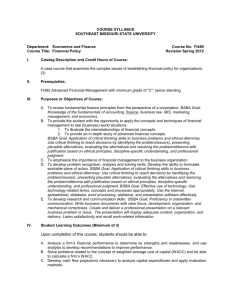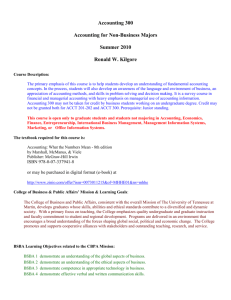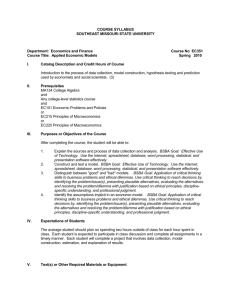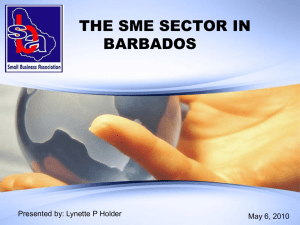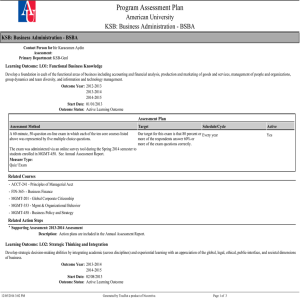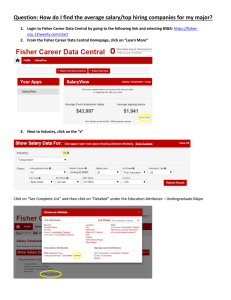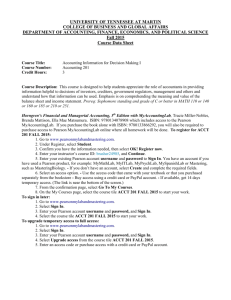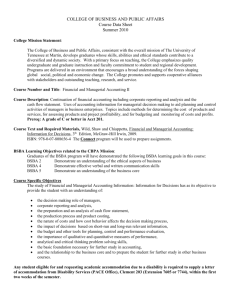COLLEGE OF BUSINESS AND GLOBAL AFFAIRS Course Data Sheet Fall 2015
advertisement
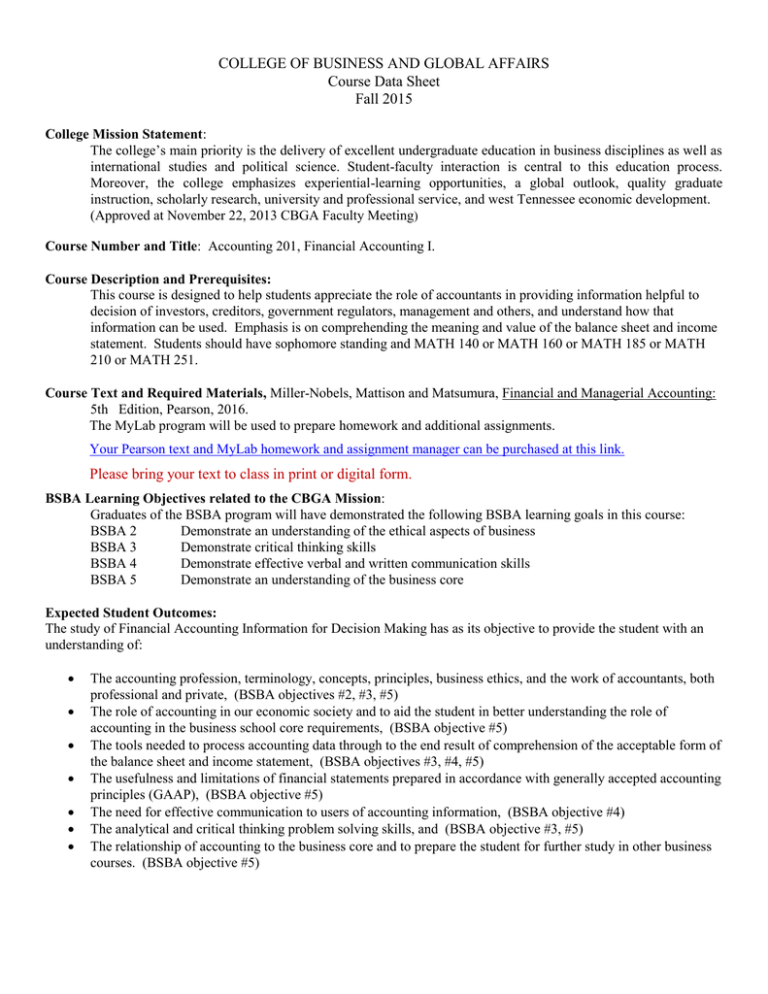
COLLEGE OF BUSINESS AND GLOBAL AFFAIRS
Course Data Sheet
Fall 2015
College Mission Statement:
The college’s main priority is the delivery of excellent undergraduate education in business disciplines as well as
international studies and political science. Student-faculty interaction is central to this education process.
Moreover, the college emphasizes experiential-learning opportunities, a global outlook, quality graduate
instruction, scholarly research, university and professional service, and west Tennessee economic development.
(Approved at November 22, 2013 CBGA Faculty Meeting)
Course Number and Title: Accounting 201, Financial Accounting I.
Course Description and Prerequisites:
This course is designed to help students appreciate the role of accountants in providing information helpful to
decision of investors, creditors, government regulators, management and others, and understand how that
information can be used. Emphasis is on comprehending the meaning and value of the balance sheet and income
statement. Students should have sophomore standing and MATH 140 or MATH 160 or MATH 185 or MATH
210 or MATH 251.
Course Text and Required Materials, Miller-Nobels, Mattison and Matsumura, Financial and Managerial Accounting:
5th Edition, Pearson, 2016.
The MyLab program will be used to prepare homework and additional assignments.
Your Pearson text and MyLab homework and assignment manager can be purchased at this link.
Please bring your text to class in print or digital form.
BSBA Learning Objectives related to the CBGA Mission:
Graduates of the BSBA program will have demonstrated the following BSBA learning goals in this course:
BSBA 2
Demonstrate an understanding of the ethical aspects of business
BSBA 3
Demonstrate critical thinking skills
BSBA 4
Demonstrate effective verbal and written communication skills
BSBA 5
Demonstrate an understanding of the business core
Expected Student Outcomes:
The study of Financial Accounting Information for Decision Making has as its objective to provide the student with an
understanding of:
The accounting profession, terminology, concepts, principles, business ethics, and the work of accountants, both
professional and private, (BSBA objectives #2, #3, #5)
The role of accounting in our economic society and to aid the student in better understanding the role of
accounting in the business school core requirements, (BSBA objective #5)
The tools needed to process accounting data through to the end result of comprehension of the acceptable form of
the balance sheet and income statement, (BSBA objectives #3, #4, #5)
The usefulness and limitations of financial statements prepared in accordance with generally accepted accounting
principles (GAAP), (BSBA objective #5)
The need for effective communication to users of accounting information, (BSBA objective #4)
The analytical and critical thinking problem solving skills, and (BSBA objective #3, #5)
The relationship of accounting to the business core and to prepare the student for further study in other business
courses. (BSBA objective #5)
COLLEGE OF BUSINESS AND GLOBAL AFFAIRS
Class Data Sheet
Accounting 201, Sections 003 and 005, Fall 2015
Class time/place: Section 003, Monday, Wednesday and Friday; 11:00 p.m. – 11:50 p.m.; BA 135
Section 005, Monday, Wednesday and Friday; 12:00 p.m. – 12:50 p.m.; BA 135
Instructor:
Dr. Ronald Kilgore
Office:
Room 138, Business Administration
Office hours: Monday, Wednesday, and Friday: 1:00 p.m. – 2:00 p.m.
Tuesday and Thursday 11:00 pm – 3: 00 pm
Other times by appointment
Telephone:
731-881-7240
Email:
rkilgore@utm.edu
Required material:
Calculators (no cell phones) are permitted.
Calculators will be provided for examinations.
Pencils and erasers will be needed in completing all quizzes and exams.
Attendance Policy
Students are expected to attend all class meetings for the entire class period.
Students are responsible for all announcements made and material covered during an absence.
All assignments will be on the course syllabus with a due date.
No assignment can be made up or turned in after the due date
If one interim exam is not taken, the comprehensive final exam grade will be substituted for that interim exam.
If more than one interim exam is not taken, the comprehensive final exam grade will be substituted for ONE
AND ONLY ONE interim exam, AND a grade of zero (0) will be entered for each additional interim exam that is
not taken.
If all interim exams are taken AND the comprehensive final exam grade is higher than the grade on any interim
exam, the comprehensive final exam grade will be substituted for the interim exam with the lowest grade.
(Exception: An absence, if appropriately documented, resulting from participation in University-sponsored
activities.)
Other
Students are not only responsible for all material in the chapters assigned in the textbook but also for all
homework assignments which are to be completed.
Students are encouraged to ask for assistance as needed.
All transfers of junior and senior level courses normally taught in the College of Business and Global Affairs
must be approved in advance by the student’s department chair (or dean) upon recommendation by the student’s
advisor.
Evaluation
EXAM
1
2
3
MyLab
MASS FINAL
Grades:
DATE and CHAPTERS
SEE CLASS SCHEDULE
SEE CLASS SCHEDULE
SEE CLASS SCHEDULE
TIME
WEIGHT
100 POINTS
100 POINTS
100 POINTS
100 POINTS
100 POINTS
A:
B:
C:
D:
F:
Day
8/24
8/26
8/28
8/31
9/2
9/4
9/7
9/9
90.0-100% of total possible points
80.0-89% “
“
“ “
70.0-79% “
“
“ “
60.0-69% “
“
“ “
Below 60%
“ “
“ “
Topic Covered
What are the
organizations and rules
that govern accounting?
What is the accounting
equation?
How do you analyze a
transaction and how do
you prepare financial
statements?
How do you use financial
statement to evaluate
business performance?
What is an account and
what is double-entry
accounting?
How do you record
transactions and what is
the trial balance?
Labor Day
Using the debt ratio to
evaluate business
performance?
Difference between cash
basis accounting and
accrual basis accounting?
Reading
Assignments
Class
Problems
{A Only}
Extra Credit
Ch.1
Relationship
to BSBA Goals
BSBA 2
P41
BSBA 2
P42, P43
BSBA 3
P44, P45
Fraud 1-1
Ch.2
BSBA 2,3 4
BSBA 5
P29, P30
BSBA 2
P32, P33, P34
BSBA 3
Ch.3
BSBA 3
9/11
What concepts and
principles apply to
9/14 accrual basis accounting?
What are adjusting
entries and the adjusted
9/16 trial balance?
What is the impact of
adjusted entries on the
financial statements and
would a worksheet help in
preparing the adjusted
trial balance?
9/18
P33
BSBA 3
P34,P35
BSBA 3
P37,P38
BSBA 3
Fraud Case
1-1 Due
9/21 Test 1
9/23 How do we prepare
Ch.4
BSBA 2
9/25
9/28
9/30
10/2
10/5
10/7
10/9
10/12
10/14
financial statements and
would a worksheet help?
What is the closing
process and how do we
close the accounts?
How do we prepare a postclosing trial balance?
What merchandising
operations? Purchases of
merchandise inventory
recorded in a perpetual
inventory system?
Sales of merchandise
inventory recorded in a
perpetual inventory
system?
What are the adjusting
and closing entries for a
merchandiser?
How are the financial
statements prepared for a
merchandising firm?
What are the accounting
principle and controls
that relates to a
merchandising inventory?
How are the merchandising
cost determined under a
perpetual inventory
system?
How are financial
statements effected by
using different inventory
costing methods? LCM &
error effects on
inventory.
10/16 Test 2
10/19 Fall Break
What is internal control
and how does it protect
10/21 assets?
What are the inventory
control procedures with
respect to cash receipts
10/23 and cash payments?
How can a petty cash fund
and a bank account be
used for internal
10/26 controls?
10/28 Career Day
What are types of
receivables and how are
credit sales recorded?
10/30
BSBA 3,4
P28,P29
P30,P32,P33
Ethics Case
4-1
Ch.5
BSBA 2,4
BSBA 3
P31
BSBA 3
P33, P34
BSBA 3
P35, P36
BSBA 3
Ch.6
Fraud Case
6-1
BSBA 3
P28, P29,P30
BSBA 3
P31,P32
BSBA 3,5
Ethics case
4-1 and
Fraud case
6-1 Due
BS
Ch.7
Ch.8
BSBA 3
P21,P22
BSBA 3
P23,P25,
P26
BSBA 3
BSBA 2
11/2
11/4
11/6
11/9
11/11
How are uncollectible
accounted for using the
direct wright-off method
and the allowance
methods?
How are notes receivables
accounting for?
How does a business
measure of the cost of a
plant asset and what is
depreciation and how is
it computed?
How are disposals of a
plant asset recorded?
How are natural resources
and intangible assets
accounted for?
P27,P28
BSBA 2
P30,P32,
P33
BSBA 2
Ch.9
BSBA 3
P30,P31
P32,P33,
P34
Ethics case
9-1
BSBA 3
Ethics case
9-1 Due
11/13 Test 3
How are current
liabilities of known
11/16 amounts accounted for?
How are payroll recorded
and how are current
liabilities that must be
11/18 estimated accounted for?
Continued
11/20
How are long-term notes
and mortgages accounted
11/23 for?
11/25 Thanksgiving
11/27 Thanksgiving
What are bonds and how do
we calculate straight11/30 line amortization?
How is the retirement of
bonds accounted for? How
are liabilities reported
12/2 on the balance sheet
How do we use the debt to
equity ratio to evaluate
12/4 a business performance
BSBA 3
Ch.11
BSBA 2
P25,P26
P27,P28,
P29
BSBA 2
Ethics case
11-1
Ch.12
BSBA 2
BSBA 2
P31
BSBA 2,4
P32,P33
BSBA 2,4
P34,P35
Ethics case
11-1 Due
BSBA 2,4
Any student eligible for and requesting academic accommodation due to a disability is required to supply a letter
of accommodation from Disability Services (PACE Office), Clement 203 (Extension 7605 or 7744), within the first
two weeks of the semester
My WebPage:
http://www.utm.edu/~rkilgore/NewWPage/beta.html
Homework Instructions:
Your MyLab Homework Manager list those assignments which should be worked on MyLab to earn 100 of your total
points. These problems will be graded by MyLab and set to me automatically. MyLab will allow you Five (5) attempts
to work each problem and will record your highest attempt. The due dates for your MyLab homework are on your
syllabus and the test dates indicated and are in red.
Ethics Challenges:
The Ethics Challenges or Fraud Cases are located at the end of each chapter. They must be emailed to me at
rkilgore@utm.edu as an attachment in Word. Please also put the Case and Chapter number. For example,
Fraudcase1-1. Please contact me immediately if there is a discrepancy. Do not wait until the end of the semester to
reconcile any differences. The burden of proof concerning completed homework and other assignments falls upon the
student. Do not delete any “ETHICS or FRAUD CASES” until you are sure it has been graded and recorded.
The Ethics Challenges or Fraud Cases represent extra credit. They can count UP to 50 Points depending upon the
quality of your answers. They represent your only chance for extra credit. Therefore, they must be earned. There is NO
curve except a possible curve on the mass exam which is determined by the departmental after the tests are graded.
College of Business and Global Affairs Honor Code
WE STRIVE:
ETHICAL:
...
To be ethical in communications with others and our actions. We know that ethical
behavior contributes to and strengthens the learning environment. We support authorized
collaboration and refrain from corruption.
TRUSTWORTHY:
To be trustworthy and to fulfill responsibilities with integrity, timeliness, and honor. We
regard trustworthiness as a jewel that should be visible to all, that can be lost with one poor
decision, and that should never be compromised.
HONEST:
To be genuine in all transactions. We tell the truth with sincerity and respect in order to
maintain an honorable reputation.
...
IDEALISTIC: . . .
To set high, moral, and achievable goals and to establish a value system that assists us in
achieving goals. We endeavor to integrate professionalism into all aspects of the
educational experience.
COMPASSIONATE: To take a stand of compassionate concern for others and to acknowledge the value within
each human being. We encourage a rich learning environment demonstrating our belief
that all people have the right to be treated with dignity and respect.
SERVICE-MINDED: To cultivate a sense of community and a spirit of teamwork by supporting peers,
colleagues, and the UTM community. We acknowledge the investment made in UTM by
many individuals, our state, and our nation by sharing the resources of our knowledge and
time with the community.
